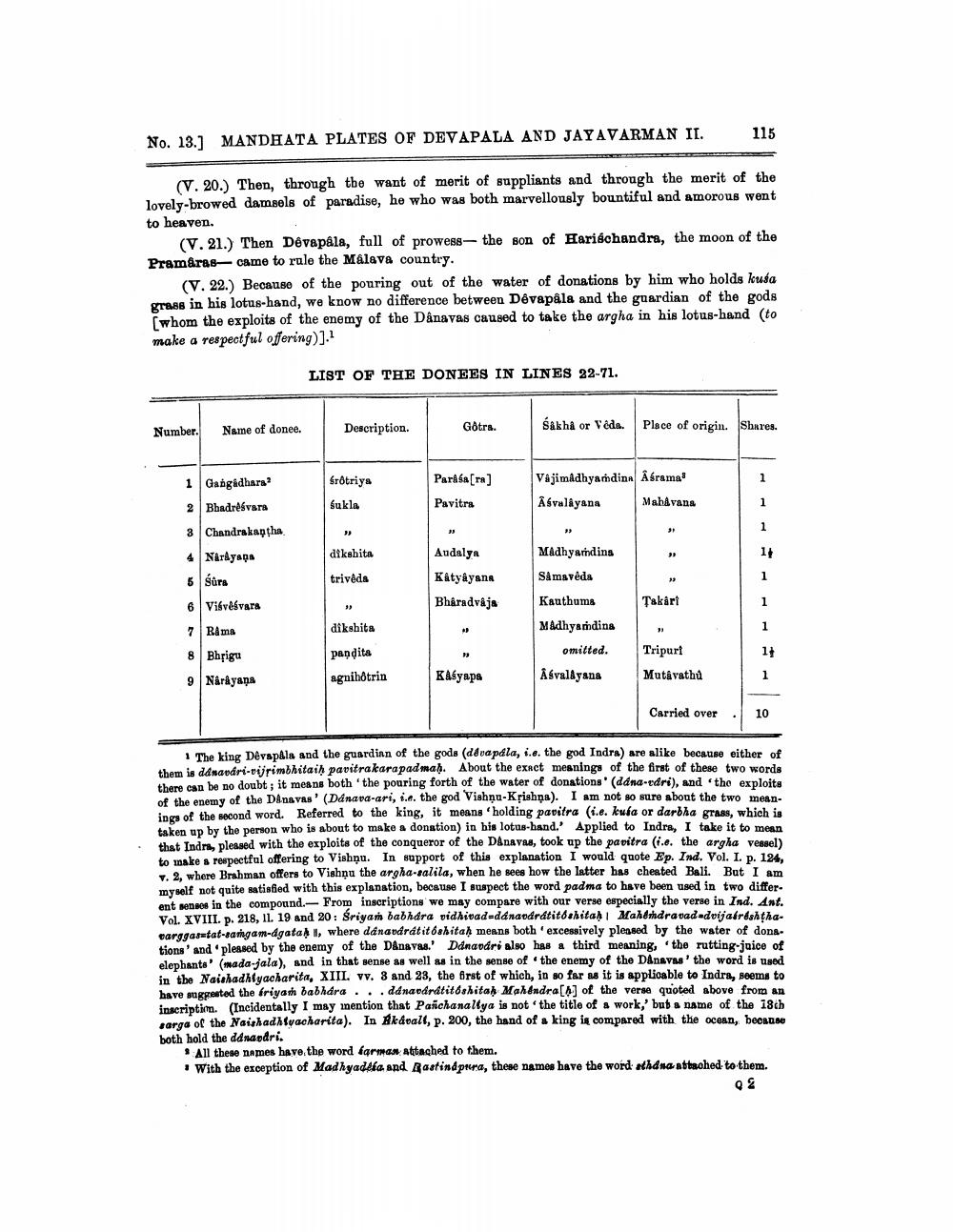________________
No. 13.] MANDHATA PLATES OF DEVAPALA AND JAYAVARMAN II.
(V. 20.) Then, through the want of merit of suppliants and through the merit of the lovely-browed damsels of paradise, he who was both marvellously bountiful and amorous went to heaven.
(V. 21.) Then Dévapâla, full of prowess- the son of Harischandra, the moon of the Pramaras came to rule the Malava country.
(V. 22.) Because of the pouring out of the water of donations by him who holds kusa grass in his lotus-hand, we know no difference between Dévapâla and the guardian of the gods [whom the exploits of the enemy of the Dânavas caused to take the argha in his lotus-hand (to make a respectful offering)].1
Number.
Name of donee.
1 Gangadhara
2 Bhadresvara
3 Chandrakantha
4 Narayana
5 Sura
6 Visvesvara
7 Rama
8 Bhrigu
9 Narayana
LIST OF THE DONEES IN LINES 22-71.
Description.
Wel
śrôtriya
Sukla
dikshita
trivêda
dikshita
pandita
agnihotrin
Gotra.
Parasa [ra] Pavitra
33
Audalya Katyayana
| Bharadvaja
Kasyapa
Såkha or Vêda. Place of origin. Shares.
Vajimadhyamdina Asrama
Âśvalâyana Mahavana
Madhyamdina
Samaveda
Kauthuma
Madhyamdina
omitted. Âśvalayana
115
33
Takari
"3
Tripurt
Mutavathu
Carried over
1
1
1
1+
1
1
1
11
1
10
1 The king Dévapåla and the guardian of the gods (dévapála, i.e. the god Indra) are alike because either of them is dánavári-vijrimbhitaiḥ pavitrakarapadmaḥ. About the exact meanings of the first of these two words there can be no doubt; it means both 'the pouring forth of the water of donations' (dána-vári), and the exploits of the enemy of the Dinavas' (Dánava-ari, i.e. the god Vishnu-Krishna). I am not so sure about the two meanings of the second word. Referred to the king, it means 'holding pavitra (i.e. kuia or darbha grass, which is taken up by the person who is about to make a donation) in his lotus-hand. Applied to Indra, I take it to mean that Indra, pleased with the exploits of the conqueror of the Danavas, took up the pavitra (i.e. the argha vessel) to make a respectful offering to Vishnu. In support of this explanation I would quote Ep. Ind. Vol. I. p. 124, v. 2, where Brahman offers to Vishnu the argha-salila, when he sees how the latter has cheated Bali. But I am myself not quite satisfied with this explanation, because I suspect the word padma to have been used in two different senses in the compound. From inscriptions we may compare with our verse especially the verse in Ind. Ant. Vol. XVIII. p. 218, 11. 19 and 20: Śriyam babhdra vidhivad-dánavárátitoshitaḥ| Mahendravad-dvijaéréshthavarggas tat-samgam-dgataḥ, where dánavárátit óshitaḥ means both 'excessively pleased by the water of donations' and 'pleased by the enemy of the Dânavas.' Dánavári also has a third meaning, the rutting-juice of elephants (mada-jala), and in that sense as well as in the sense of the enemy of the Danavas' the word is used in the Naishadhiyacharita, XIII. vv. 3 and 23, the first of which, in so far as it is applicable to Indra, seems to have suggested the friyam babhdra...dánavárátitóshitaḥ Mahendra[4] of the verse quoted above from an inscription. (Incidentally I may mention that Panchanaliya is not the title of a work,' but a name of the 18th sarga of the Naishadhiyacharita). In Akávali, p. 200, the hand of a king is compared with the ocean, because both hold the dánardri.
"
s All these names have the word farman attached to them.
With the exception of Madhyadéia and Rastindpura, these names have the word athana attached to them.
02




